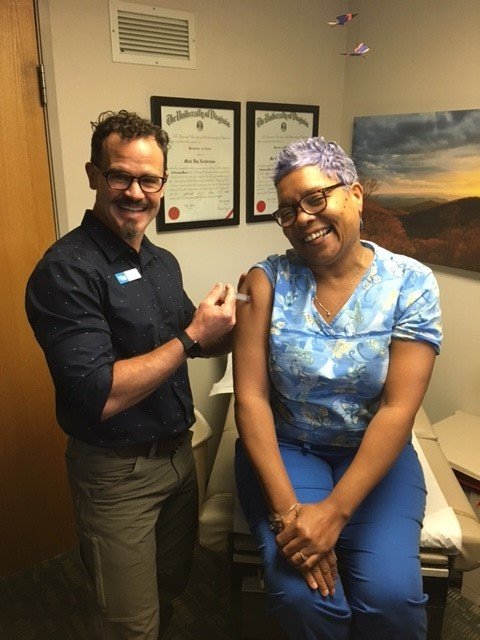By Jeffrey Graham, MD, MPH
With the beginning of school just around the corner, there’s no better time to update your family’s shot record!
In an age of rapidly-advancing medical technology and rising medical expenses, the most cost-effective intervention you can choose for your family is to vaccinate them against preventable diseases. In fact, it could be argued that the most important advance in the history of modern medicine has been the development of vaccinations against infectious diseases.
While it is important to get all your immunizations, there are a few that are of particular importance because they are new or because they address diseases that are becoming more common in our population.
1) Gardasil for prevention of Human Papilloma Virus (HPV): About 50% of women and 45% of men are exposed to HPV at some point during their lives. While it doesn’t always cause disease, it is the primary cause of genital warts, cervical cancer, anal cancer, and penile cancer. It is transmitted sexually and is extremely communicable. There are two types of Gardasil immunizations, one that covers the four most dangerous types of this virus and one that covers nine of these types. Because HPV affects both men and women, it is recommended that both boys and girls get this 3-shot series between the ages of 9 and 26. Most patients start at the age of 11-12.
2) TdaP for prevention of Tetanus, Diphtheria, and Pertussis (Whooping Cough): Hopefully we all know that Tetanus is an important immunization to keep up to date, but did you know that Whooping Cough has made a resurgence in the last couple of decades? Because of this, when you get your first booster shot after childhood, it should be with a dose of TdaP, not Tetanus toxoid (Td) alone. After you’ve received one dose of TdaP, you’ll receive the Td booster only every 10 years to ensure you are not affected by Tetanus, a highly deadly disease.
3) Menactra or Manveo for prevention of Meningitis: Meningitis is a serious infection involving the central nervous system. It can be caused by bacteria or viruses, but this vaccine covers the more serious bacterial causes of meningitis. The immunization should be given at age 11-12 with a booster at age 16. Your doctor may talk to you about another booster just before college depending on the timing of your other doses, as this is a serious disease amongst people aged 18-23.
4) Zostavax for prevention of Shingles (HSV): If you’ve ever had shingles, you know how painful it can be! Did you know Shingles is one of the most common complaints we see in patients over the age of 65? So, starting at age 60 years old, you should have your Zostavax immunization. While it doesn’t guarantee you will not get shingles, it will reduce your chances and ensure your disease is less severe if you do get it.
5) Prevnar and Pneumovax for reduction of disease burden with Pneumonia: The guidelines for vaccination against the bacteria that most commonly cause pneumonia have changed over the years, but the bottom line is that you should receive two different doses of pneumonia vaccine after age 65 years old. In addition, your doctor may advise you to get one of the immunizations prior to turning 65 years old depending on your medical conditions. While these immunizations do not prevent you from getting pneumonia, if you do become ill with pneumonia, you are less likely to die from it if you’ve had these shots.
6) Influenza Vaccine for prevention of the Flu: Did you know that the Flu is responsible for up to 50,000 deaths per year in the United States? It’s a prime example of highly preventable disease that can be deadly. While the vaccination does not always protect against all strains of the Flu, it does prevent infection with the most common types each year. A common myth about the Influenza vaccination is that it can cause the Flu—this is not true. The immunization is made up of inactivated or “dead” virus particles that do not cause disease.
You may have noticed quite of bit of buzz in the media recently about the safety of immunizations. To date, there is no evidence that the commonly recommended vaccinations cause harm, and they DO prevent disease. If you have demonstrated an allergy when receiving an immunization in the past, talk to your doctor about the reaction you had. There may be a variant of the vaccine that would still work for you, or there may be a method to reduce the reaction.

